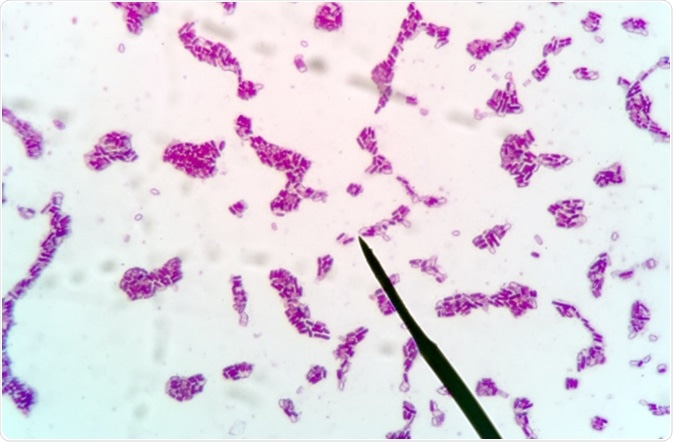
Botulism Prevention and Treatment Options
Skip to:
Botulism is a neuroparalytic syndrome caused by botulinum, a neurotoxin produced by the bacterium Clostridium botulinum. The toxin attacks the patient’s nerves and causes breathing problems, muscle paralysis, and in extreme cases, death.

Clostridium botulinum gram stain. Image Credit: Patiyurh Sirisukpokar / Shutterstock
The causative bacteria are found on the surfaces of vegetables, fruits, and seafood; hence, food is the primary route of spread of these bacteria. Home-canned, preserved, or fermented foods are more likely to cause botulism. Low-acid foods are the most common sources of home-canning related botulism. Contamination can occur when the food is improperly prepared and stored.
Infant botulism cases are caused by the bacteria present in soil and dust. Honey is another source of botulism in infants below one year of age.
Wound botulism is a rare form of botulism caused by infection of a wound by Clostridium botulinum.
Iatrogenic botulism is a form of botulism which follows upon therapeutic doses of botulinum toxin type A for spasticity and blepharospasm.
Botulism can have severe consequences and hence warrants accurate diagnosis and prompt treatment. The first step is a thorough medical history to note the characteristic symptoms of the infection. The condition is confirmed by detection of the toxin in feces or blood.
How is botulism treated?
Gastric lavage or enemas are administered in foodborne botulism; these techniques help to clear the digestive system by inducing vomiting or bowel movements.
Antitoxins are used to treat botulism; however, antitoxins cannot reverse the damage the toxin has already done. Antitoxin binds to the circulating toxin and helps in preventing further harm. Timely administration of antitoxin reduces the risk of complications. Botulinum immunoglobulin is used to treat infants with botulism.
Hospitalization may be required in severe cases. In extreme cases, it may take months and extended rehabilitation therapy to recover completely. Rehabilitation therapy helps to improve speech, swallowing, and other disabilities caused by the disease.
If the patient presents with breathing problems or respiratory failure, artificial respiration via ventilator must be initiated urgently. Respiratory failure is caused by paralysis of the respiratory muscles by the botulinum toxin.
In cases with wound botulism, it is essential to remove the infected tissue surgically. Antibiotics must also be administered.
What are the best ways to prevent botulism?
Foodborne botulism – Foodborne botulism can be prevented by using proper heat-sterilization and canning procedures to destroy the causative bacterium and its spores. The heat must be high enough and sustained for a long enough period to inhibit bacterial growth and toxin production.
Foodborne botulism can be prevented by following good practices during food preparation, such as:
- Use good quality fresh food for safe home and commercial canning and bottling. All the items for canning should be thoroughly washed, cleaned, and sterilized before use in canning.
- Selecting the right canner is essential. All parts of the pressure canner should be in good condition. Pressure canners should be used for low-acid foods like potatoes, asparagus, corn, and meats; the use of boiling water canners should be avoided.
- Ensure the foods are sufficiently acidic; lemon juice and vinegar can be used to increase the acidity artificially.
- Ensure the foods are correctly heat-processed and follow proper processes in the making of fermented foods.
- The manufacturer’s instructions should be followed for food storage and shelf life. Cold food should be stored below 5°C and hot food at a temperature above 60°C.
- When opening a jar of home-canned food, a thorough inspection of the food is necessary before consumption. Avoid consuming foods from damaged cans or bottles.
Wound botulism - Wound botulism can be prevented by keeping the wound area clean and treating the first signs of infection. Pus, swelling, redness, pain, and fever are some signs that the wound is infected. Wound botulism can also occur after injecting illicit drugs such as black tar heroin. It can even happen after traumatic injuries. Hence it is essential to be alert to signs of infection in these cases.
Infant botulism - Infants younger than 12 months of age should not be given honey in any form, whether added to food, water, or any formula.
Iatrogenic botulism - Iatrogenic botulism can be prevented by using only licensed products.
Sources
- Mayoclinic.(2018). Botulism. Diagnosis and treatment. www.mayoclinic.org/.../drc-20370266
- Center for disease control and prevention (CDC). (2019). Botulism. Prevention. https://www.cdc.gov/botulism/prevention.html
- World health organization (WHO). (2018). Botulism. https://www.who.int/news-room/fact-sheets/detail/botulism
Further Reading
Last Updated: Jul 18, 2019
































No hay comentarios:
Publicar un comentario